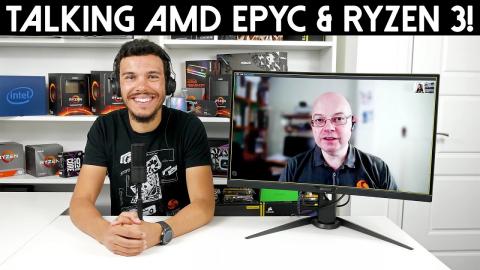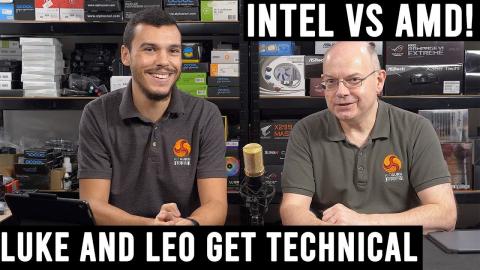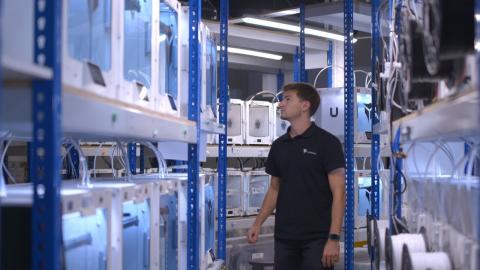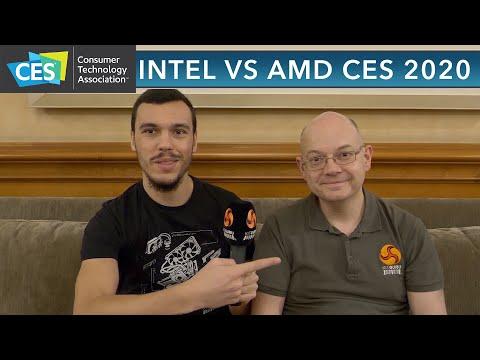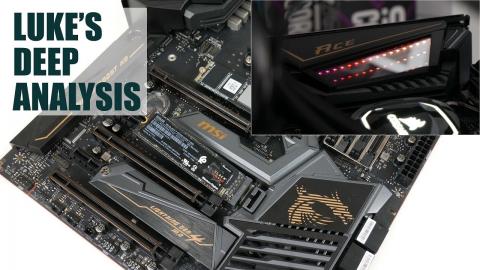Luke Gets Technical EP 1: Ryzen 3000 Success, X570 & AM4 BIOS issues, AGESA 1.0.0.3 Testing
Description
AMDs new platform launched a while ago and Luke Hill, one of KitGuru's Senior Technical Editors was impressed at launch time, saying it was a great step forward for AMD and of great benefit to the enthusiast consumer. After spending some time with the platform he wanted to share some of his technical in depth analysis to this point. This video is likely not for everyone as it is quite technical in parts, but we know some of you will appreciate it. more over at www.kitguru.net
TIME STAMPS
00:13 Luke gets technical
00:33 Ryzen 3000 has been a success
03:16 Bios/Software Issues
10:23 Applying Precision Boost Overdrive
11:55 X370 testing failures
14:16 Backwards Compatibility
16:16 Slides from ASUS suggesting PCIe Gen4 support on older motherboards
17:10 Software reading issues and sensor drift
21:36 AGESA Update for Boost Frequencies
24:39 Chipset fans are horrible
27:08 Luke wraps up
Lukes Notes:
• Ryzen 3000 has been very well received by most people. Gaming performance improvements are good, multi-threaded and productivity numbers are outstanding, and the value for money is impressive. It was quite surprising to see AMD CPUs occupying 8 out of 10 spots in Amazon’s list of processor ‘Best Sellers’, ‘Most Gifted’, and ‘Wished For’ at various points over the past few days.
• Robert Hallock’s post on Reddit is extremely informative in the area of voltage levels and helps to clearly explain some of the high voltage levels that people are seeing, which could easily be mistaken for software reading errors. Check it out here: https://www.reddit.com/r/Amd/comments/cbls9g/the_final_word_on_idle_voltages_for_3rd_gen_ryzen/
• As with any new platform launch, the BIOS situation is challenging. There have been plenty of BIOS updates in the early days of the Ryzen 3000 and X570 launch, bring with them AGESA microcode updates. These present a challenge for reviews who can only realistically test hardware in a snapshot of time. Equally challenging is this situation for the motherboard vendors who, I am confident, will be working overtime in Taiwan to get the new BIOSes rolling through and the bugs ironed out.
• Some of our internal testing has shown Precision Boost Overdrive (PBO) – AMD’s user-friendly overclocking tool – to be applied by default within the BIOS, without user consent. This is not good as AMD makes it clear that PBO overclocking will void the AMD processor warranty, so no motherboard vendor should be taking this liberty without user consent.
• Testing on one of our X370 motherboards has been a complete disaster. The BIOS file is one of the least stable that I have ever seen in all my years of testing hardware. Mouse support is completely broken within the UEFI, which is annoying but certainly forgivable. Memory training errors which prevent system POST and boot without clearing of the CMOS is less forgivable, however.
• ASUS PCIe Gen 4 support has been highlighted on a slide that has been floating around the web. Surprisingly, the lower-end boards get better PCIe Gen 4 compatibility than the higher-end ones, according to the slide. Nevertheless, the prospect of using a ludicrously-fast PCIe Gen 4 NVMe SSD on older AM4 motherboards is certainly something for enthusiasts to get excited about.
• Watch out for software reading errors in the various go-to packages that we use, including Ryzen Master. We have seen various errors ranging from the suggestion of broken cores on our Ryzen 9 3900X CPU to load operating figures that don’t match up with recorded performance levels. Ryzen still has the somewhat irritating temperature sensor drift behaviour that we have seen since day 1 with Ryzen 1000. Have you seen similar behaviour on your system?
• AGESA 1.0.0.3 had very little effect on our performance data compared to 1.0.0.2. Clock frequencies for the Ryzen 9 3900X continue to run at around 4100MHz for all-core loading. Single-core spikes up towards 4.6GHz are recorded, but there’s no flat line pinning one of the cores at 4.6GHz. Perhaps this is the silicon lottery limiting the success of AMD’s Precision Boost 2 algorithm. Or perhaps there are still further clock optimisations available through future AGESA microcode updates.
• Chipset fans are horrible. But at least better fan speed control is available in some BIOSes and coming in updates for others. I still don’t really know why the fans are necessary for the X570 chipset, especially after the excellent power consumption testing done by der8auer. T
• Ryzen 3000 is excellent but there’s no doubting that there are bugs and challenges for early-adopters. I sincerely expect the more critical of these bugs to be ironed out over the next few weeks, so early adopters should hang in there, keep an eye on their favourite websites and forums, and check regularly for BIOS updates on their board manufacturer’s website.


